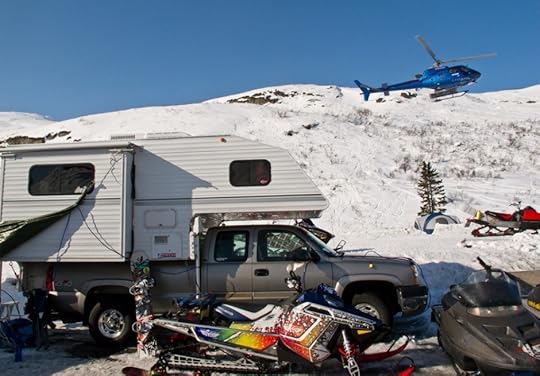Matador Network's Blog, page 2304
March 6, 2014
Around the world via solar airplane

All images courtesy of Solar Impulse SOLAR IMPULSE
The last year has been a very busy one for the Swiss-based project known as Solar Impulse. Apart from successfully completing a two-month mission to fly across the US using a 100% solar-powered airplane — the first of its kind (able to fly through the night) — they’ve also been building a new and improved prototype plane.
Bertrand Piccard, a doctor, psychiatrist, and aeronaut, is perhaps best known for being the first person to fly around the world nonstop in an aerial balloon. André Borschberg is an engineer and professional airplane and helicopter pilot who flew in the Swiss Air Force. Both Piccard and Borschberg take turns piloting the aircraft, which has a cockpit that only fits one. The success of Solar Impulse in flying a zero-emissions airplane is an encouraging step in the direction toward a movement of clean energy technology and being less dependent on fossil fuels.
I caught up with Piccard and Borschberg to ask them more about Solar Impulse and their upcoming plans.
* * *
TL: First of all, congratulations on the ongoing success of this revolutionary endeavor! How did it all start, and when?

Piccard and Borschberg
BP: The Solar Impulse program started off with the aim of building an airplane capable of flying night and day without fuel, propelled solely by solar energy. After the success of the first historical 26-hour flight in 2010 and the crossing of the USA in 2013, our goal is to fly around the world in 2015.
Our success, however, will not only come from completing a round-the-world tour without fuel, but will also motivate everyone to implement the necessary measures to reduce our dependence on fossil fuels.
Can you tell us a bit about the plane you use? How is it different from other solar-powered aircraft that have been developed in the past?
AB: The airplane captures all the energy it needs from solar cells. These cells convert the sun’s rays into electricity to be able to simultaneously power the engines and recharge the batteries so that the plane can fly throughout the night. The amount of energy collected is relatively modest, and we had to carry out a lot of research to minimize consumption. The project is therefore primarily a demonstration of energy saving that can be achieved with currently available technologies.
How long can the plane be flown before running out of energy?
AB: Solar Impulse has been designed and built to collect enough energy in the batteries during the day in order to fly through the night on this energy until the next sunrise, when the pilot will be able to switch on the solar generator to produce energy and continue the flight. Each flight is well prepared by our team in order to never run out of energy! The plane is capable of flying several days and nights in a row without fuel, thus making the concept of perpetual flight more realistic.
Solar Impulse is more than just an airplane, isn’t it? Bertrand, you have said that: “Our airplane is not designed to carry passengers, but to carry a message.” Can you explain what that means?
BP: Our message highlights the importance of a pioneering and innovative spirit, especially in the domain of clean technologies. Nowadays, the technological solutions that allow Solar Impulse to fly both day and night are accessible to all and are replicable in everyday life. These are not secret, futuristic technologies. If they were used routinely in our society, we would be able to save 50% of our consumption of fossil energies and to produce half of the rest with renewable energies.
Solar Impulse wants to emphasize the energy solutions as well as the environmental and political solutions from a decidedly constructive angle in order to engender enthusiasm and the necessary motivation to leave behind this pervading fatalism. Aviation makes you dream, feeds your passions. A plane that flies without fuel and achieves something everyone imagined impossible will fire our imaginations.
You are currently building a new aircraft, the HB-SIB. What does this stand for, and how will this prototype improve upon the existing model — the HB-SIA?
AB: Mainly four things:
Firstly, we want improved performance — that is to say, we want to reduce our energy consumption and have more reserves.
Then, we’re modifying the cockpit to improve ergonomics.
In addition, we need a more reliable aircraft with redundant safety systems and leak-proof electrical circuits in order to fly in humid conditions.
Finally, we will have a form of autopilot, that we call Stability Augmentation System (SAS) which will maintain flight attitude and a directional heading so that the pilot will be allowed to rest.

How will the around-the-world flight in 2015 be done?
BP: The World Tour will take place over several stages with 2-3 day flights over the continents and 4-6 days over the oceans. We will take turns at each stop. The route is not fully defined yet. It is now studied using simulation models developed by our partner Altran and our meteorologists. The main stages will include Europe, a country in the Gulf, India, China, Hawaii, and the USA returning via Europe or North Africa.
In what ways are you preparing for this?
AB: We both took up the challenge of staying at the controls of the flight simulator for an uninterrupted period of 72 hours needed for a virtual crossing of the Atlantic. To draw all the lessons from this experiment and measure our mental and physical condition in real time, a whole battery of tests was performed by the Solar Impulse team in cooperation with experts in every field. Fatigue, cockpit ergonomics, nutrition, use of the toilets, exercises to prevent thrombosis, vigilance, and the ability to pilot the aircraft in a state of sleep deprivation were all assessed.
This preparation will be followed by a program of test flights and training around Payerne airfield (Switzerland) in order to learn how to fly the new airplane. Due to its immense size and extreme lightness, Solar Impulse 2 is very sensitive to turbulence and wind during takeoff and landing. This spring, we will also realize a virtual round-the-world flight through simulation, in order to know if we will be able to maintain the aircraft in good weather conditions.
What safety precautions do you take when piloting the plane? Do you wear a parachute?
BP: We always embark with a parachute, a life raft, and a survival vest with military standard equipment. We need to be prepared in case we face an emergency situation with no other option but for the pilot to exit the aircraft.
How do you deal with the weather?
AB: To avoid turbulence caused by thermals, the aircraft must take off and land early in the morning or late in the afternoon. The surface wind must be less than 10 knots (~11.5mph) and the crosswind 4 knots (~4.6mph).
To guide us and choose the best weather window we have a mission team, composed most importantly of Altran engineers who are highly specialized in trajectory simulations, and two brilliant meteorologists from the Royal Institute of Meteorology: Luc Trullemans and Wim De Troyer. Luc has already guided Bertrand during his round-the-world balloon flight; he is an exceptional router. They will guide the pilot during turbulence, find favorable winds, good altitudes, and sunny areas. The entire team will play a key role in completing the world tour.
What are some inconveniences of solo-piloting the plane for so many hours that people might not think of? How do you go to the bathroom??
BP: The resting strategy and the vigilance are very challenging. There will be no sleep over populated areas, and we have developed techniques for resting our bodies while remaining awake. I personally use self-hypnosis techniques, whereas André uses yoga techniques. Above the oceans, sleep will be allowed in short naps of a maximum of 20 minutes since the second plane, planned for the world tour, will be equipped with a form of autopilot that we call Stability Augmentation System, and will allow us to keep flight attitude and a heading.
In case of emergency, like if turbulence were to destabilize the plane, vibrating sleeves will wake up the pilot by showing him the direction and the tilt to correct. Regarding bathroom, we have toilets integrated in the seat.
Do you think that solar-powered planes will be the future of commercial air travel?
BP: We will surely see small solar seater planes soon. We do not foresee solar-powered commercial aircraft in the near future, but we must remember the past. In 1903, when the Wright brothers succeeded in flying their airplane over a distance of 200m, could they imagine that 24 years later, Lindbergh would cross the Atlantic Ocean solo? And 30 years later, airliners would carry 200 passengers, completing the same journey in eight hours, while two men walked on the moon! [image error]

For more information on Solar Impulse, and to keep updated on their 2015 around-the-world preparations, check out their website: solarimpulse.com.
The post Around the world in the first solar-powered airplane appeared first on Matador Network.

Reaction of man being tricked
I WAS PRETTY pissed when I first listened to MagicofRahat’s plan to give a losing lottery ticket to a homeless man. It seemed like an episode of Punk’d gone horribly wrong. However you feel about the homeless, no one deserves to be treated in such an inhumane way.
What actually happens in this video not only surprised me, but also made me cry into my cup of Japanese Sencha. Sometimes, it’s easy to forget how privileged I am; it’s time to be more grateful for the things we have, because we might not have them tomorrow. 
The post The reaction of this homeless man after being ‘tricked’ will blow you away appeared first on Matador Network.

This is the ultimate language quiz

Photo: danorbit.
Learning to ask for beer in a foreign language is the modern traveler’s adult equivalent of their first “dada.” Usually belched from an early post-diapered understanding that this language thing was going to be important.
And, as it turns out, you were right. Whether it’s haggling in markets or talking to the police, language can make a huge difference when you’re out there brushing up against all the strange folk of the world. That said, there are a lot more actual languages than you’ll ever have the time or inclination to learn. Languages with clicks, languages that sound angry, languages that make you sound like a snake. And languages that appear to have no vowels whatsoever.
So even if you can’t understand what’s being said, would you be able to identify the language being spoken around you in the lift? On the bus? In an Eastern European forest dance festival?
The Great Language Game gives you a chance to find out. [image error]
The post This is the ultimate language quiz for travelers appeared first on Matador Network.

What to expect from a dancefloor in Madrid
When I’m abroad, in between the jet-lag and the general desire to get acquainted with a new place, the first thing I tend to do is take a peek at the nightlife. That experience always seems to go as follows.
In my hippest attire, I set out to the nearest club expecting:

(via)
But I arrive to find:

(via)
And instead of bumping something like this:
They’re playing:
Whoops.
Having made my fair share of these mistakes (such as wandering unknowingly into my first “psytrance party” expecting a rave in New York, and a swinger’s lounge expecting a popular nightclub in Portland), I’ve learned the hard way that even a little research pays off before club hopping, or committing to going out in the first place.
With that in mind, here’s what you can expect from a dancefloor in Madrid.
* * *
First and foremost, it’s no secret that Spain is one of the premier nightlife hubs in the world, and this directly impacts the everyday. Lunches, for example, are often in the mid-afternoon, dinner is seldom before 10pm, and 2am signals the time to start partying.
Though Madrid ranks third (just behind its cousin Barcelona, in turn behind the infamous Ibiza) as a world nightlife destination, all that means is the clubs will be marginally less crowded and touristy. They’re still going to be crowded and touristy, and that’s probably “what to expect” #1. Though, despite the fact that the drinks will be egregiously overpriced (what to expect #2), it should actually come as something of a comfort to be in the mix with a herd of people from around the world having fun, as opposed to being the only foreigner in a locals’ club, trying to figure out how everyone else seems to look like this:

(via)
While you feel like you look like this:

(via)
So, let’s look at a couple of the most popular big name clubs in Madrid, where you can still get a taste of la noche with the training-wheels on:
Teatro Kapital

(via)
Now, when I said training wheels, I meant it relatively. When it comes to partying, the seven-floor multi-genre megaclub Kapital ain’t messin’ around. Armed with 20 TECNARE LA208 arrays as well as SW215 subwoofers, the house sound system ensures you will have no problem finding the club, since you’ll be able to hear the beats from several blocks away.
Yes, it’ll probably cost you about 20 euros to get in, but once inside, you’ll find yourself right in the middle of a scene like this:
Or, if you’re lucky, a scene like this:
You’ll be subject to the absolute cutting edge of techno, RnB / hip hop, and electro / tech / progressive house. In fact, it’ll probably sound an awful lot like this:
Or anything from the club’s own SoundCloud:
If you’re like me, you’ll immediately wade through the fog of sweat and aerosolized deodorant and make a beeline for any of the three bars surrounding the main dancefloor. Sadly, the cocktail and beer offerings are pretty standard fare, and Kapital doesn’t have a signature drink (though if you pre-gamed with some Spanish sangria at dinner, you probably only need a vodka-Red Bull to keep the buzz going and the night alive).
Club Fabrik

(via)
King of world-renowned house, techno, and trance acts, the 10,000-person-capacity, two-hangar Club Fabrik (complete with a three-tiered main stage) is bound to be hosting a huge party with artist names you may even recognize. It’s ranked the fourth best club in the world, complete with six dance areas, 15 bars, and a pulsing 60kW sound system (so you can expect to feel the bass rattle your ribcage, and walk away with tinnitus as a souvenir from your night out).
Another 20 euros and you’re in the club, which is bound to look like this:
(That pillar of smoke coming down in the middle of the dancefloor is actually cooling water vapor from the venue’s many ice machines, which they blast periodically throughout the evening.)
With a large space and an even larger following, the club appeals to a wide variety of tastes, depending on the night — so be sure to check the flyers before dropping in:
The beats tend to be a little heavier at Fabrik than at Kapital, with hard techno acts ranking as some of the most popular events.
Those would sound a bit like:
Again, it never hurts to visit the club’s SoundCloud:
With no signature drink, it’s in your best interest to pregame elsewhere, as the drinks are as expensive as they are generic.
Charada

(via)
Fine, you want to take the training wheels off, you are the more adventurous, hip, and authentic clubgoer, and for that we’ll look at Charada. A relatively new, exceedingly hip(ster), and considerably smaller club, Charada is the place for electro house and funk music in their “Redbox” and “Blackbox” dance halls. On Wednesday and Saturday nights, the extremely fashionable clubhopping elite head to Charada for their Boombox, Zombie, and Pantera events.
After dropping another 15-20 euros to get in, you’ll find that Charada bumps like this:
And sounds like this:
How to dance
As for dancing at any of these locations, you’ll easily get away with the club classics — “jumping-up-and-down-fist-pumping” and/or grinding (partner permitting) — but you might just catch some of the kids dropping into their Spanish-style shuffling:
Note: Shuffling originated from hardstyle culture, and was flung forcibly into public consciousness thanks to the unfortunate global virality of this:
It’s now a worldwide and genre-nonspecific phenomenon. The US has over six different distinct styles, ranging from “classic” (or Melbourne, very tight and technique heavy) to “Cali style” (loose and wide, with a bit more b-boy top-rock flair). The differences are subtle, but what seems to characterize the Spanish style is a harder stomp, less out-flair, and a lot more jumping, as opposed to the glide-heavy and wide American Melbourne.
At 7am most of these clubs finally close, and if you did it right you might feel a bit like:

(via)
And need a pick-me-up like:

(via)
But walking back to your hostel, it’ll be just early / late enough to catch this:

(via)
The post What to expect from a dancefloor in Madrid appeared first on Matador Network.

Michoacan
THE STATE OF MICHOACAN, MEXICO has always seemed to have a bad rap. Even back when I first traveled there in 2001, people said to watch out for banditos, and indeed when I first arrived in the tiny village of La Ticla, there was a military truck full of Federales apparently as some kind of deterrent. Anyway, while the pacific coast there has long been explored by surfers, the inland areas are largely untouched as far as exploration by paddlers. Even right there at La Ticla was a beautiful canyon upstream that I wondered about. Had anyone ever paddled it?
Next week, Red Bull will be dropping Michoacan: First Descent, which follows a crew led by Dane Jackson and Rafa Ortiz that finally explores the area. They definitely still play up the inseguridad as a hook (as did I in the title of this post), but what I’m stoked on is just getting a chance to see some of these rivers for the first time. [image error]
Feature image via Redbull.
The post Michoacan “is death” appeared first on Matador Network.

4 years to perfect your curling
The Olympics are over, but if you’ve found yourself filled with athletic fervor and have decided to add “win an Olympic Medal” to the bucket list, your best bet is probably curling. Not only does it regularly involve drinking during gameplay, but it’s one of the least physically demanding sports of the Olympic events. This isn’t to say it’s easy: it does require a good amount of skill, as it’s basically shuffleboard on ice, but it doesn’t require insane 10,000 calorie diets like that of Michael Phelps, or impossibly difficult training schedules. On top of this, there does not appear to be an age limit: the oldest ever winter Olympian was a curler.
Personally, I’ve never been that impressed with curling until I saw this awesome video, narrated by David Attenborough to be like a nature show. Then I thought: chilling out on the ice with a bunch of my friends, drinking and pushing rocks around? Yeah, I can think of worse ways to spend my time. Pyeongchang 2018, here I come. 
The post You’ve got 4 years to perfect your curling skills appeared first on Matador Network.

Powder for Powder, episode 3
ARRIVING AT THE PARKING LOT on Thompson Pass felt like reaching the light at the end of a very long tunnel — after all, five days on the ALCAN Highway from Revelstoke is no small feat. Yancy and I pulled in late night in a sideways blizzard to the mountain pass we would call home for the next three weeks. We decided to come a week early to feel out the snow and lay some fresh tracks before the tailgating madness began. Emerging from the camper the next morning, I kept an eye on my brother’s face as his eyeballs widened, seeing snow-caked mountains rising 4,000 vertical feet straight from the parking lot. “H-o-l-y Shiiit,” he exclaimed.
Tailgate Alaska is held at the base of the Worthington Glacier, the closest possible parking to world-renowned powder turns. By means of touring gear, snowmobile, and helicopter, people of all walks of life migrate to Valdez, AK each spring to rip some classic Alaskan terrain on either side of the Richardson State Highway. Tailgate Alaska, now in it’s fifth year, has grown to almost 500 people from a small diehard crew of five guys dreaming big and not afraid to share the wealth. Weathering all conditions, meeting new people, enjoying the scenery/beer, learning about snow safety, and of course, getting into big lines, is what Tailgate is about.
With 3 heli operations within 15 miles, getting on the schedule for an unforgettable day is easy. For the more cost-efficient scenario, bring your snowmobile and you will not be disappointed with how many long pow laps you will log, sometimes when the heli can’t even fly.
Yancy and I met up with many good friends who’d made the pilgrimage to AK, and the good times started flowing, as did the free Alaskan Amber beer. You know you’re in the right place at the right time when seasoned big mountain riders tell you at the nightly bonfire that they just rode the best spine or chute run of their entire life. Powder is usually plentiful, but beware of waking to boiler plate backside turns the next morning — the wind can howl across the Chugach! Even with 500 people, though, the Alaskan terrain is so vast and abundant that the thought of it getting tracked out is not a concern.
After five days of bluebird powder, another storm rolled in to hit the reset button just in time for the “King of the Hill” Freeride World Championship event, put on by Tailgate Alaska. Low and behold, I picked a technical line to ride that had sheltered powder inside a nook on Python Peak, rode it clean, and took home the championship title and samurai sword. I was stoked that my peers voted my line as the winning run, as it always feels good to come out victorious knowing your fellow riders approved.
Our crew awoke each morning not knowing what the winter wonderland of the Chugach Mountains would bring. But as all good things must come to an end, the Tailgate lot dispersed in a flurry as another heavy storm socked in…and another legendary Alaskan event was about to unfold a short 160 miles to the north. The energy of Arctic Man was calling, and good friend Nate Holland promised powder in the Hoodoo Mountains. 
Words and photos by Wyatt Caldwell; video by Yancy Caldwell.

1
Home sweet home. Not a bad place to park for three weeks...that is, if you don't mind the sound of helicopters and snowmobiles every morning.

2
Here's a view of the famous zone called "The Books" due to its bookshelf-style ramps. It's a risky 16-mile sled ride each way...better not get caught in the quick-building fog.

3
Sledding in Alaska is humbling to say the least. Vast mountains present dangerous crevasses, meaning picking the right route of travel is a must in order to access the goods.

Get access to all 5 episodes as they're released: Powder for Powder

4
Yancy getting his mind blown 3,000 feet to the valley floor, in an area known as Loveland.

5
The harbor at Valdez has some classic maritime history, as evidenced by a graveyard of ships lining the marina. If wrecks could talk, these would have some tales to tell. The Kingfisher is only taking the winter off, and will return to the water after the spring snow melt.

6
A day out with H20 heli was part of the "King of the Hill" Freeride World Tour. "Just another run in the Chugach."

7
Yancy amping on his super loose run down the Tiger's Penis spine. His first AK heli run!

8
Yancy and I pause to shoot a time-lapse and take a breather after hiking Python Peak, behind us.

9
The evening light creeps up the Python as we race to hike the ridge at sunset. Feeling lucky to be in the right place at the right time.

10
I managed to take home the W and the samurai sword along with women's champ and Japanese ripper Yoko Nakamura.
The post Powder for Powder, ep. 3: Tailgate Alaska appeared first on Matador Network.

How to piss off someone from Manchester

Photo: Tony Eccles
Welcome to Manchester, fondly known of as “Madchester” thanks to our music scene of the ’90s, or “Gunchester” in more recent years, but we’re not going to go into that. As one of the largest cities in the UK, the second largest if you count Greater Manchester, Mancunia, the capital of the North, is home to a diverse range of people, but with one thing in common — what pisses us off.
So how do you well and truly boil our piss?
Start a Northerners vs. Southerners argument.
This great debate takes place at universities up and down the country as Mancs, Scousers, Geordies, and the like are lumped into one category in a faceoff with country bumpkins, Cockneys, and toffs. While those from the Midlands get to sit on the fence, choose their side, or more likely have their side chosen for them because apparently if you’re from anywhere north of London, you’re a Northerner.
Whichever side you’re on, let’s face it, somebody’s going to get pissed off. As far as Mancunians are concerned, you will come across two types of people. The first type will vehemently defend Manchester and her Northern sisters until they can think of no other way to win than to shout the other down with a rendition of “Oh Manchester is wonderful, oh Manchsterrrr is wonderful…”
And then there are those who seriously couldn’t give a shit. It’s not that they aren’t loyal and dutiful Mancs, they just don’t care that you believe you don’t have an accent because you’re from the South.
Support the wrong football team.
If you thought the North vs. South debate was bad, think again. The rivalry between Manchester United and Manchester City fans is unmatched. I have fortunately only been witness to some amicable banter between reds and blues, but know for a fact that people can turn sour when riled up over the beautiful game.

More like this: How to piss off a Manchester United fan
For that reason we have red and blue pubs. And whether you even like football or not you have to choose a camp for derby day. If you’re from Manchester and support Liverpool, you will be mocked into eternity. Supporting Everton, forget it. Arsenal, Chelsea, or Spurs, even worse.
Talk about the weather.
Unlike many Americans who are able to politely joke about poor weather, us Mancs straight up moan about ours constantly. It’s always rainy in Manchester! It is cold and rains almost half of the days in every month, including summer. And I would say it’s grey for most of the other days.
It’s no wonder then that every other Mancunian is swanning off to Australia when the opportunity arises. Or at the very least they’re counting down the days until their beach holidays on Facebook — enough already.
Don’t talk to us on the bus.
Or in a queue, or at a supermarket checkout, or at the bar…I’m sure you get the gist. What can I say? Us Mancs are just very friendly, chatty people.
Do an impression of a Manc and get it completely wrong.
What does someone from Manchester actually sound like? Are they forever lengthening their i’s like a member of Oasis? (“Slip inside the eye of your miiiiiind…”) Do they wander around saying things like “reet” and calling everyone “duck” like they’re on Coronation Street?
For the large part the answer is no. The above questions are actually giving those who attempt a Manchester accent too much credit. What you mostly hear is a sort of standard Northern speak, which usually just means a poor imitation of a Yorkshire accent as in “t’other” or “I’m goin t’ shop.” WE DON’T SPEAK LIKE THAT! [image error]
The post How to piss off someone from Manchester appeared first on Matador Network.

Why empowering women is priority #1

Photo: Gates Foundation
1. Women start small businesses faster than men.
From home-based micro-businesses to small startups and shops, women will create over half of the 9.72 million new small-business jobs Forbes is predicting we’ll have by 2018. Not only are women creating more jobs, the National Federation for Independent Businesses says women-owned small businesses weather recessions more effectively and show more adaptability than men-owned small businesses. Want to have more jobs and more stability in the workforce? Support women’s business!
2. Insane innovation comes from women!
If the pee-powered generator built by a group of 14-year-old girls in Nigeria wasn’t enough, what about this Turkish girl who figured out how to turn bananas into bioplastic…or Ada Lovelace, who invented the first computer program? Women have been innovating and excelling in the fields of science and math for hundreds of years…despite facing harassment and discrimination. More empowerment means more women in science, which means more life-saving inventions.
3. Half the world’s population are women.
Literally half of the seven billion people on the planet are female, yet a white woman in the United States makes 80 cents for every dollar a white man makes (black women make 70 cents and Hispanic women make 60 cents, by the way). If 50% of global population suffers daily discrimination, increased risk of assault, and all kinds of other delightful problems just by virtue of being female, we can say that empowerment should be a top priority.
4. Save your country’s economy!
Financial empowerment of women spurs economic growth within a country…which can lead to the country becoming more stable, reducing poverty, and becoming a bigger player in the global market. Having more bargaining chips on the table can help a country’s leaders make better deals with other governing bodies, as well as receive aid and support more effectively. Bottom line: More empowered women means more safety and security.
5. We’ll see more and better food, for everyone.
The vast majority (80%) of agricultural workers in the world are female. Empowerment to grow, buy, and sell the crops they want decreases malnourishment in producing countries and increases the amount of food available for export. Did you eat today? Thank a (female) farmer.
6. Better lives for men!
If women are empowered, that frees men from the pressure to be the primary wage-earner and shows little boys they can explore all aspects of who they are, without paying attention to roles that are traditionally “masculine” or “feminine.” Men will have more freedom to work part-time or take care of children, which frees them up for other, more interesting activities. What’s the advantage to this? Society loosens up, and everyone is free to be who they truly want to be. Sounds pretty amazing.
7. Political empowerment means more and better policies.
When policymakers are mostly men, it seems like the needs of women (and a lot of other people) get thrown by the wayside. When women stand up in political forums, we get legislation that can save lives, protect young girls, and provide access to needed healthcare. If we want our daughters to have the care they need in the future, we need more women in political power now. Empowerment for everyone!
8. Down with capitalism!
Are you a social activist? Do you hate big corporations like Coca Cola and Unilever? Did you camp out in Zuccotti Park with the rest of Occupy? The social, political, and financial empowerment of women would require massive shifts and changes to the status quo…you know, the patriarchal hegemonic white supremacist capitalist situation we have going on right now. What would we get in its place? Who knows, but it couldn’t be worse, right?
9. Better literature!
Two-thirds of the 774 million adult illiterates across the world are women. Imagine if the best book you’ve ever read was going to be written by a woman who hasn’t yet been taught to read? Women’s empowerment will lead to more journalism, better books and movies, and more interesting stories being told. As a kid who grew up with my nose in a book, this sounds like the best possible outcome for everyone.
10. Overturn nasty beauty standards…for everyone.
Everyone’s seen beauty magazines, with their focus on hairless, sculpted, unreal, bleached and plucked specimens of humanity…and that’s just the men. The current beauty standards teach everybody to hate themselves because they’re too fat, too hairy, too old, or just plain not airbrushed enough. If we’re willing to empower women to accept who they are and how they look (beautiful!), men will reap the benefits and stop having to worry about their appearances and feel bad too. Throw the beauty magazines away before we all feel ugly.
11. Disappearing indigenous cultures could get a new shot at surviving.
In Canada, the Idle No More movement, started by four women, grew to be an international rallying point for indigenous rights and activism…and Chief Theresa Spence of Attawapiskat went on hunger strike for six weeks to convince the Prime Minister to discuss the dangerous poverty her community was enduring. Australia just elected its first Aboriginal Parliamentary member in 2013, while New Zealand had a Maori transwoman as an MP for the Labour Party from 1999-2007. All these loud women mean native cultures are getting revitalized in new and exciting ways.
12. Save the planet!
If fertility rates continue the way they are now, scientists estimate the world’s population will swell to 10 billion by 2081. That’s 10 billion people competing for food, water, and other resources. One of the best ways to ensure that we live in a safe, healthy, and sustainable world is to support women who want reproductive healthcare and effective contraception. Nobody wants to worry about fighting for fresh water, and empowering women with voluntary family planning is a surefire route to a happier, healthier planet. 
The post 12 reasons why empowering women should be the world’s top priority appeared first on Matador Network.

March 4, 2014
Finding the lost River Effra, London

All photos: Author
The River Effra is one of London’s great lost waterways. Rising near Crystal Palace, its course flows through Norwood, Dulwich, Herne Hill, Brixton, and Kennington, before finally emptying into the Thames beside Vauxhall Bridge. Since Victorian times this ancient river has been lost from sight, however, flowing through subterranean passages and drains deep beneath the city streets.
I took a trip down to London Below in order to walk the course of this long-forgotten Thames tributary.
The River Effra
The Effra is referred to frequently in historical texts. In Thames: Sacred River, Peter Ackroyd writes that the Effra took its name from the Celtic word yfrid, meaning “torrent.” One myth tells that Queen Elizabeth I sailed the Effra in her royal barge, to visit Sir Walter Raleigh at his Brixton home.
By the late 17th century, though, the Effra (like most of London’s waterways) had begun to deteriorate into an open sewer.
In the mid-19th century, the famed civil engineer Sir Joseph Bazalgette redirected some segments of the Effra to form the Southern High Level Sewer, also known as the Effra Sewer, as well as the Southern Low Level Sewer, which in turn feeds into the Southern Outfall Sewer. One of the more notable stretches lies beneath Effra Road in Brixton, supposedly accessible through the crypts of St. Luke’s Church at West Norwood.
A local legend from Victorian times describes a coffin which appeared floating down the Effra. The corresponding grave at West Norwood Cemetery was found to be untouched, however, and so it was concluded that the casket had subsided into a section of the subterranean river below.
Loitering on a street corner until a gap appeared in the flow of disinterested passers-by, we made a decisive dash toward the drain cover.
My guide on this voyage into the dank bowels of London was local explorer Keïteï. She was no stranger to the subterranean network of drains and sewers that fan out beneath the streets of the capital, and was keen to revisit the Effra, so often overlooked in favour of its larger lost cousin, the River Fleet.
We met near Clapham, following a series of residential streets until we reached our entry point: an unexceptional manhole cover set into a stretch of suburban pavement. It was daylight still, and a steady stream of commuters were drifting past us from the tube. We would have to time it perfectly.
We opted for a policy of speed rather than subterfuge; all being well, we decided that it should take us no longer than 20 seconds to lift the lid, reach the ladder inside, and close the drain behind us. Anyone who spotted us — be they public, police, or the council authorities we had briefly considered impersonating — would have to act fast if they were going to stop us. Once inside, it seemed unlikely anyone in their right mind would follow us down.
Loitering on a street corner until a gap appeared in the flow of disinterested passers-by, we made a decisive dash toward the drain cover, lifting it without difficultly, and, alive with adrenaline, I followed Keïteï down the rusted ladder and into the stale darkness below.
To London Below
The first access ladder was relatively short, but just a few feet away from its base the real descent began — a long shaft falling away to the river itself, the ladder disappearing into darkness.
On finally reaching the banks of the Effra, the word ‘river’ seemed like something of a misnomer. Instead, we found a trail of black slime smeared along the belly of a grey concrete tube. Several rats looked up in surprise at our arrival — their dull, beady eyes throwing back the torchlight — before turning tail to disappear into the hidden depths.
The tunnel angled downwards as it flowed past us, right to left, in the direction of the Thames. Here the murky liquid grew deeper, black with corruption and as still as a corpse. A loud belch echoed about us from somewhere downstream — the “Gurgle Pit,” as some explorers know it.
We turned right, away from the miasma, and waded upstream. The still water was thick with sediment, a black sludge flecked with traces of white and grey which looked suspiciously like fat deposits. Strange tufts of mould would occasionally drift past our feet, sprouting from tiny rafts of unnamable, buoyant matter.
At regular intervals, chains had been hung across the waterway to catch floating debris. Now these were thick with rags, snatches of clothing, hair and ribbons, which had built up over the years. I found a beaded necklace suspended from one of the furry chains, twisted into a rope of discoloured fabric.
In Victorian London, there were people who made a living collecting such trinkets. These brave souls would sail along London’s hidden rivers on punts or barges, fishing for scrap metal or jewelry that had accidentally made its way into the city’s drains.
We lit candles, the simple ritual exciting a ruddy glow from the surrounding walls.
From time to time, red brick passages led off to either side. Many were fitted with ladders back to the surface, to emerge through unmarked drain lids trodden each day by countless unsuspecting pedestrians. In one alcove a rule had been placed to measure depth — an indication that the Effra was not always so feeble as it now appeared, at the height of a rare English drought. Another siding led to a vast sluice gate, designed to control the flow of other drains joining the subterranean river.
Soon our surroundings changed. Reaching a junction between streams, the grey tunnel gave way to elaborate brickwork. Vaulted red passages formed an ornate intersection, the carefully laid bricks throwing back our torchlight in shades of red and orange, accentuated with subtler blue-green hues. Some urban explorers refer to Effra as the “Rubix Drain” — most likely a comparison between the multichromatic brickwork of the Southern Outfall Sewer and a Rubik’s Cube.
It was strange to observe just how much thought the Victorians had put into the design of their subterranean canals — spaces never intended for human traffic — and yet it seemed a fine example of the mentality of the day: function never without care for form, grand gestures made simply because they could.
We lit candles, the simple ritual exciting a ruddy glow from the surrounding walls. Just then a drain further upstream must have flooded a gate, and a new lease of life bubbled through the tunnels ahead. Here was the torrent at last, a playful stream rising fast around our boots. Writing about the sacred forces of the Effra, Ackroyd claims, “its powers have departed.” Although the river’s strength may be diminished, the vaulted red tomb Bazalgette built for her — itself a wonder of civil engineering — holds a tangible power all its own.
After several hours exploring the drain, we emerged through the same hatch. Coming out is sometimes riskier than going in — you never know who’s going to be about. On this occasion the street was empty, however, as we rolled from the top of the ladder onto the pavement, leaving trails of clay-like muck spread across the tarmac. On the far side of the street, now dimmed by twilight, a lone cyclist stood playing with his helmet — awkwardly adjusting straps, checking his tyres, inspecting his phone — anything but acknowledge the two strange figures that had just crawled giggling out of a sewer.
I threw him a cheery smile as we vanished into the night. ![]()
This post was originally published at The Bohemian Blog and is reprinted here with permission.
The post Descending into the lost River Effra, London appeared first on Matador Network.
Matador Network's Blog
- Matador Network's profile
- 6 followers






